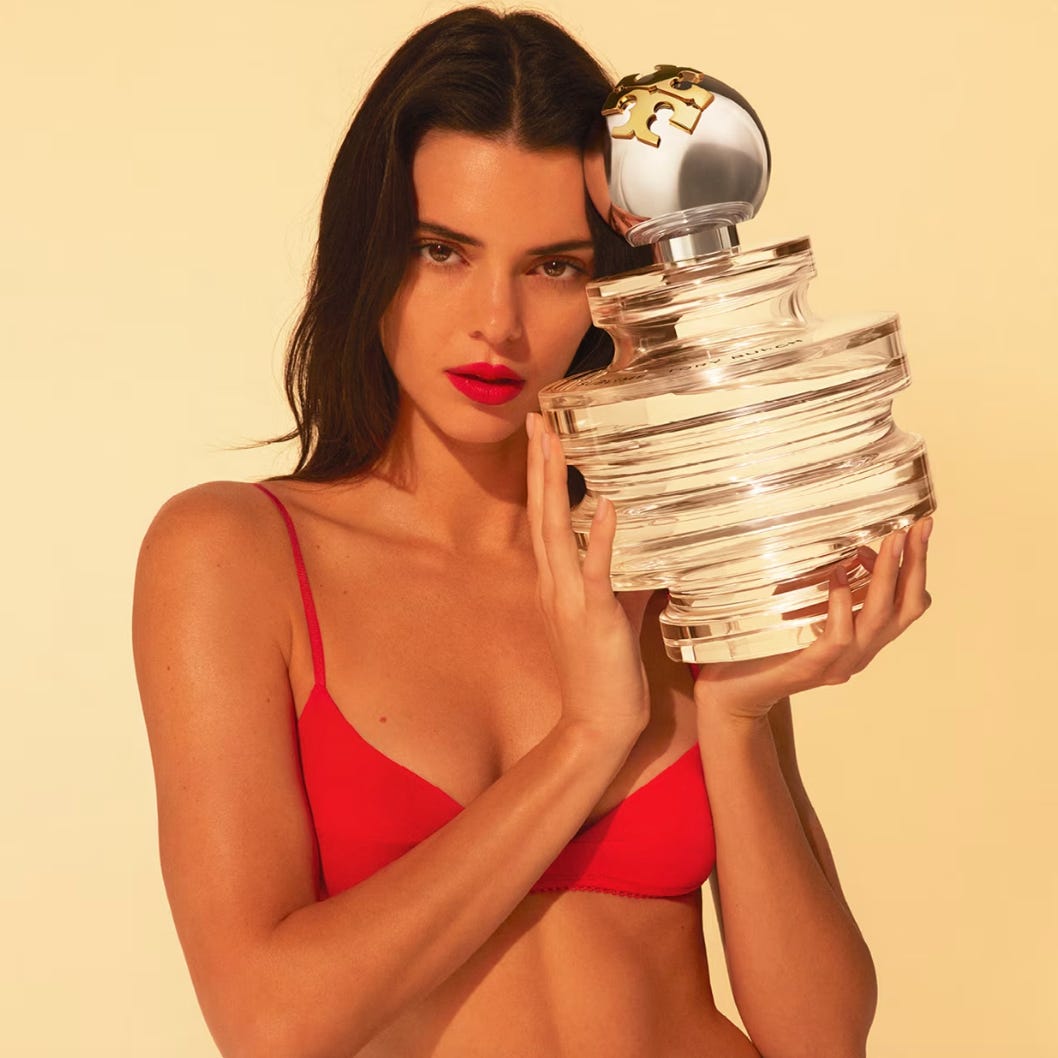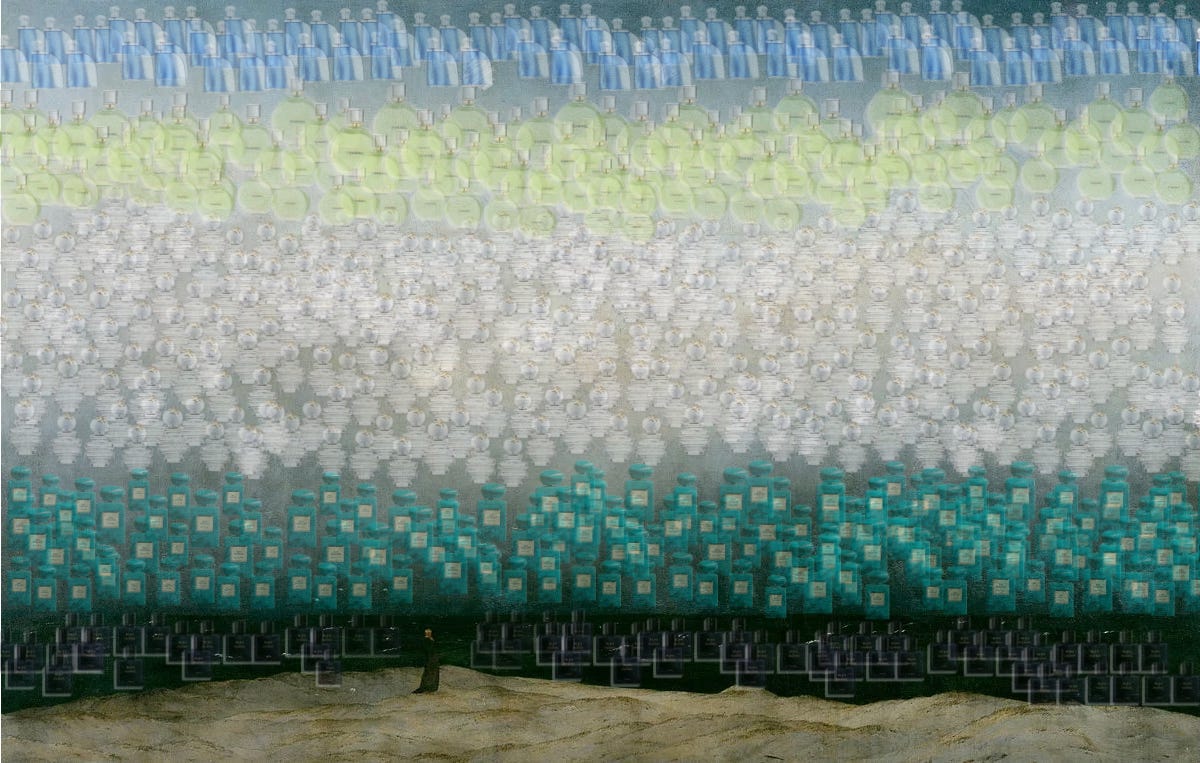Tory Burch released a new scent this week: Sublime. The name references what philosophers Immanuel Kant and Edmund Burke considered the height of aesthetic experience, and comes at a moment when beauty enthusiasts consider fragrance the height of aesthetic experience.
Perfume is booming, to say the least. Both the premium and mass markets saw double-digit growth year-on-year in 2023, and today, the global sector is worth an estimated $68.9 billion. In terms of per capita revenue, that means every person on the planet contributed $8.74 in 2024. These numbers are thanks, in part, to consumer perception of fragrance — it sidesteps the problems of the flesh inherent in other cosmetic categories, allowing for an exploration of “identity” that seems more spiritual than superficial (without sacrificing consumption, of course) — as well as investments in the space from celebrities (Kylie Jenner, Sabrina Carpenter, Bella Hadid), beauty brands (Charlotte Tilbury, Violette FR), fashion houses (Dior, Dolce & Gabbana; the former’s aroma for babies, the latter’s for dogs), and podcasters (Naked Beauty Planet).
“Cedarwood can be elevated to the sublime when paired with a delicate neroli,” said Naked Beauty Planet founder Brooke DeVard in a recent interview with People Brands and Things.
I don’t think Burch and DeVard are using the word sublime in the Kantian sense. But their turns of phrase propose an interesting question: Is perfume sublime?
According to Kant, the sublime is the counterpart of the beautiful. “The beautiful in nature concerns the form of the object, which consists in limitation,” he wrote. “The sublime, by contrast, is to be found in a formless object insofar as limitlessness is represented in it” — a star-filled sky, a stormy sea, an experience that fills you with wonder and awe. I can see an argument for scent as sublime here, not in itself (the bottle, the juice) but in action.
One common justification for purchasing perfume concerns its connection to the limbic system. Smell is the only one of the five senses that bypasses the thalamus, an area of the brain associated with logic, and instead interacts with the “reptilian” brain structures of the hippocampus and amygdala, which are associated with emotion and memory. A spritz can transport you through time and stir your feelings in a way that sometimes seems “limitless,” especially in comparison to the limit of human knowledge on the subject. “Smell remains to this day the least understood of all the senses,” Theresa Levitt writes in Elixir. “Scientists have only recently begun to realize how complex it is — far more complex than vision, and more intimately connected to the brain.”
Kant also described the sublime as “a negative pleasure,” referencing Burke’s explanation of it as being grounded in “fear … a pain … a kind of pleasing horror, a certain tranquility that is mixed with terror.” This, too, might apply to fragrance.
Consider some of today’s headline-worthy notes — blood, sweat, melting plastic — and perfume advertisers’ favorite marketing term: nostalgia. Plenty of popular scents bank on that bittersweet pain of longing for the past, of calling up a memory that calls up your mortality. (Time is passing! Your mind can go back again, but you cannot! The you from the past that once smelled this smell is gone, a ghost! The you that’s smelling it now will soon be one, too!) In an interview with Vogue, Bella Hadid says her new essential oil concoction is “an ode to that nostalgic vanilla scent we all smelled in the girl’s locker room in high school” — and what is a high school locker room if not “a certain tranquility that is mixed with terror”?
In order to meet Kant’s definition of the sublime, though, the experience must be disinterested, or experienced for its own sake — not because it benefits the experiencer. To this end, perfume doesn’t fit the bill.
“It makes you feel like the best version of yourself,” DeVard says of her latest launch. Tory Burch Sublime gives you “the feeling and sense of self,” the product copy reads. There are countless articles on perfumes that will “bring in the compliments” and more online message boards discussing the same. These selling points are not disinterested, but self-interested. (Not necessarily a bad thing, or a moral failing, but also not sublime.)
Ultimately, Kant wrote, “what is properly sublime cannot be contained in any sensible form, but concerns only ideas of reason.” So even though we refer to the sensible object (the sky, the sea, and sure, the perfume) as sublime, the object itself is not the sublime thing. It’s merely a vehicle that reveals the sublimity of the human mind — its rational capacity to comprehend infinity. Encountering the sublime “demonstrates a faculty … that surpasses every measure of the senses.”
If anything in this scenario can be considered sublime, it’s the ability to understand what fragrance does to us: knowing aromas provoke emotion, realizing the capacity for transcendence is located in the mind. I tend to bristle when someone invokes the infinite, emotional, spirit-grazing potential of smell while promoting a purchasable perfume — because we possess this potential even when we don’t possess perfume! We carry it with us. We encounter it every day, through the basil plant on the windowsill, or the curry sauce on the stove, or the sweat on our partner’s skin. Buying a pre-bottled scent doesn’t activate this power; this power is just easily co-opted to convince us to buy.
It’s been said that “the beautiful turns us outward, while the sublime is a turning inward.” I like a good eau de parfum as much as the next person, but to take the inward experience of scent and turn it back outward — toward a collection of mass-produced, $155, 90-mL glass bottles — is, I think, to negate its sublimity.
Who’s gonna tell Tory?






My mom never wore any scent, not even scented detergent, but still had the most distinctive scent. Some beautifully soft skin smell. About 3 years after she died, I passed someone in a store who somehow smelled just like her. As soon as that scent hit my nose, before I even comprehended what was happening, I started crying.
Now that was sublime. Painful, but an incredible moment of being connected through time and planes of being by a scent I can’t even describe. And the best part is is that there’s no crap for me to buy to get that experience again. It was just serendipity and all the more beautiful for the brief, intense moment.
Thanks for the sublime connection to scent. I will be thinking about this for a long time.
You know what I smell? Desperation. Desperation literally smells like these packaged synthetic fragrances to capture yet more attention and money and our withering imaginations under the spiritual disease of capitalism, where words get to mean anything you want if you’re selling something. One day we will smell lilacs blooming on the branch and appreciate it specifically because they are so beautifully fleeting. We will continue waking up, one by one, as we tire of the soulless existence of everything and every experience being sold to us. Because I know more and more of us are sick of this garbage. Anyway, en point take, as usual.